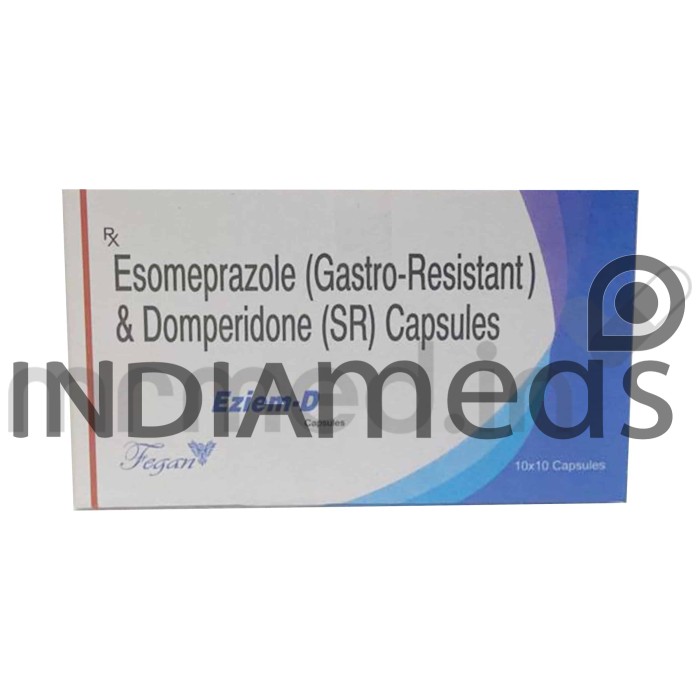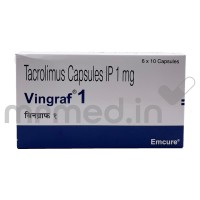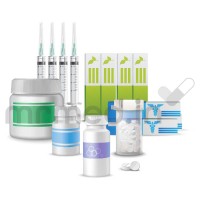Eziem D Tablet is a combination medication that belongs to the proton pump inhibitors (PPIs) and dopamine antagonists category containing the active ingredient Esomeprazole, Domperidone. This drug treats conditions such as gastroesophageal reflux disease (in which the stomach acid and contents flow back into the esophagus), peptic ulcers (a sore or erosion that forms on the stomach lining), and nausea and vomiting.
This medicine is contraindicated in people with a history of cardiac arrhythmias such as ventricular fibrillation, ventricular tachycardia, or QT prolongation or in those taking medications that prolong the QT interval. This tablet may cause side effects such as dizziness, drowsiness, or vision changes in some individuals. If these effects occur, avoiding activities requiring alertness, such as driving, cycling, or operating machinery, is important until you feel better.
Long-term use of this medicine may result in low magnesium levels in the body (hypomagnesemia). Symptoms of low magnesium levels include fatigue, muscle spasms or weakness, irregular heartbeat, and seizures. If you develop any of these symptoms, notify your doctor immediately. It is necessary to discuss using Eziem D Tablet with your physician if you are pregnant, suspecting pregnancy, or breastfeeding.
Therapeutic Effects of Eziem D Tablet
Pregnancy
If you are pregnant, suspecting, or planning for the pregnancy, report to your doctor before starting the treatment with Eziem D Tablet.
Breast Feeding
It is unknown if Eziem D Tablet passes into the breast milk or if they will harm your baby. Please consult your doctor before breastfeeding.
Lungs
Consult your doctor if you have lung problems before taking Eziem D Tablet.
Liver
Inform your doctor if you have liver disease because Eziem D Tablet should be used cautiously with a liver condition.
Alcohol
It is unknown whether consuming alcohol while taking Eziem D Tablet is safe. Please speak with your physician.
Driving
Traveling, driving vehicles, or operating heavy machinery is safe after taking Eziem D Tablet. This medicine does not impair your ability to drive or use machines.
Common
- Headache
- Stomach pain, accumulation of gas
- Nausea, vomiting
- Constipation
- Diarrhea
- Benign polyps in the stomach (masses of cells form in the stomach lining)
While taking this medicine, making certain dietary modifications to support your treatment may be helpful. Avoid foods and beverages that trigger your symptoms, such as spicy or acidic foods, caffeine, and alcohol. Eat smaller meals and avoid eating close to bedtime. Consider elevating the head of your bed to help reduce nighttime acid reflux.
While there are no specific dietary restrictions associated with Eziem D Tablet, following a healthy diet and lifestyle modifications is generally recommended to support gastrointestinal health.
Yes, Eziem D Tablet can relieve heartburn, especially when associated with gastroesophageal reflux disease (GERD) or peptic ulcer.
Eziem D Tablet target both the overproduction of stomach acid and impaired gastrointestinal motility, addressing multiple aspects of the underlying causes of GERD. This combination can provide complete relief and help improve digestive health.
Common side effects of Eziem D Tablet may include nausea, vomiting, infection, rash, itching, painful or tender breasts, and back pain. These side effects are usually temporary and set back to normal as the medication is eliminated.
Eziem D Tablet is generally considered safe for the kidneys. It is metabolized in the liver and mainly excreted through the bile. The kidneys play a minimal role in eliminating this drug from the body.
Molecule name: Esomeprazole+Domperidone | Therapeutic class: Antiulcer+Antiemetic |
Pharmacological class: 1.Esomeprazole-Proton pump inhibitors 2.Domperidone-Dopamine antagonist | Indications: 1. Gastroesophageal reflux disease (GERD) 2. Peptic Ulcer 3. Treats Nausea and Vomiting |




